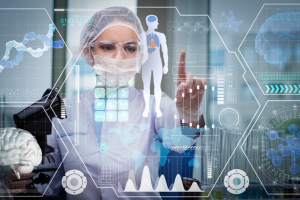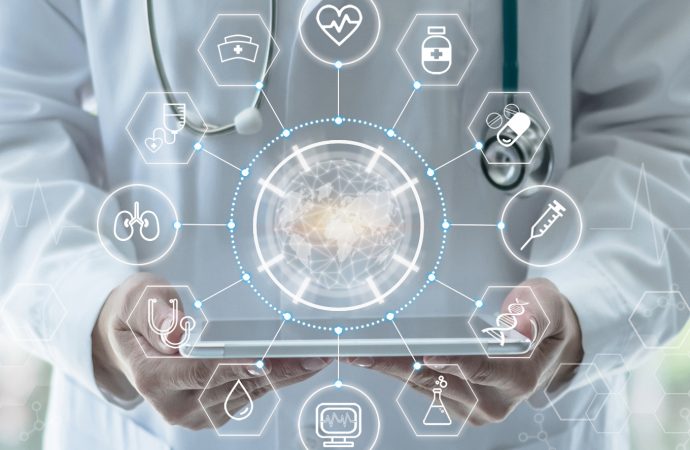Introduction: Welcome to the forefront of healthcare innovation, where artificial intelligence is reshaping the landscape of medicine as we know it. I’m Dr. Alex Carter, a medical researcher with a passion for exploring the intersection of technology and healthcare. Healthcare Revolution Join me as we uncover the top 12 ways that artificial intelligence is set
Introduction:
Welcome to the forefront of healthcare innovation, where artificial intelligence is reshaping the landscape of medicine as we know it. I’m Dr. Alex Carter, a medical researcher with a passion for exploring the intersection of technology and healthcare. Healthcare Revolution Join me as we uncover the top 12 ways that artificial intelligence is set to revolutionize the field of medicine, from improving diagnostics to revolutionizing patient care.
1. Enhancing Diagnostic Accuracy with AI
Artificial intelligence algorithms have demonstrated remarkable capabilities in analyzing medical data and identifying patterns that human eyes might miss. From interpreting medical images to analyzing patient symptoms, AI-powered diagnostic tools can enhance accuracy and Healthcare Revolution speed in disease detection.
2. Personalized Treatment Plans Tailored by AI

Image by: https://media. licdn.com
By analyzing vast amounts of patient data, including genetic information, medical history, and treatment outcomes, AI can help clinicians develop personalized treatment plans tailored to each patient’s unique needs and characteristics. This approach, known as precision medicine, holds the promise of improving treatment outcomes and minimizing side effects.
3. Streamlining Medical Imaging Interpretation
AI algorithms can analyze medical imaging scans such as X-rays, MRIs, and CT scans with unprecedented speed and accuracy. By automating the interpretation process, AI can help radiologists prioritize cases, reduce diagnostic errors, and improve patient outcomes.
4. Predictive Analytics for Disease Prevention
AI-powered predictive analytics can analyze vast amounts of patient data to identify individuals at risk of developing certain diseases or health conditions. By intervening early with preventive measures, healthcare providers can mitigate risks and improve long-term health outcomes.
5. Optimizing Hospital Operations and Workflow
AI-driven solutions can optimize hospital operations by predicting patient admission rates, optimizing staffing levels, and identifying inefficiencies in workflow processes. By streamlining operations, healthcare facilities can improve patient care, reduce costs, and enhance overall efficiency.
6. Virtual Health Assistants for Patient Engagement
Virtual health assistants powered by AI technology can provide patients with personalized health recommendations, medication reminders, and lifestyle coaching. By engaging patients in their own care, these virtual assistants can improve adherence to treatment plans and promote healthier behaviors.
7. Drug Discovery Accelerated by AI
AI algorithms can analyze vast amounts of biomedical data to identify potential drug candidates and predict their effectiveness in treating specific diseases. By accelerating the drug discovery process, AI has the potential to bring life-saving medications to market faster and more efficiently.
8. Precision Medicine through Genomic Analysis
AI-powered genomic analysis can analyze an individual’s genetic makeup to identify genetic variations that may impact their risk of developing certain diseases or their response to specific medications. By integrating genomic data into clinical decision-making, healthcare providers can deliver more personalized and effective treatments.
9. AI-Powered Robotic Surgery
Robotic surgery systems equipped with AI algorithms can enhance surgical precision, reduce human error, and improve patient outcomes. By combining the expertise of surgeons with the precision of robotic technology, AI-powered robotic surgery holds the promise of revolutionizing surgical procedures across specialties.
10. Remote Patient Monitoring and Telemedicine
AI-enabled remote patient monitoring devices can continuously collect and analyze patient data, allowing healthcare providers to monitor patients’ health status remotely. This enables early intervention in case of health deterioration and facilitates virtual consultations through telemedicine platforms.
11. AI-driven Healthcare Fraud Detection

Image by: https://media. licdn.com
AI algorithms can analyze healthcare claims data to detect patterns indicative of fraudulent activities, such as billing errors or improper coding. By identifying and preventing fraudulent practices, AI-driven healthcare fraud detection systems can save healthcare systems billions of dollars annually.
12. Ethical and Regulatory Considerations in AI Healthcare
As AI continues to permeate the healthcare landscape, it’s essential to address ethical and regulatory considerations related to data privacy, patient consent, algorithm bias, and accountability. By establishing clear guidelines and standards, we can ensure that AI technologies are deployed responsibly and ethically in healthcare.
Visual Table for Key Points:
| Key Points | Details |
|---|---|
| Diagnostic Accuracy with AI | Improved speed and accuracy in disease detection |
| Personalized Treatment Plans | Tailored treatments based on patient characteristics |
| Medical Imaging Interpretation | Automated analysis of imaging scans for faster diagnosis |
| Predictive Analytics for Prevention | Identifying at-risk individuals for early intervention |
| Hospital Operations Optimization | Streamlining workflow and improving efficiency |
| Virtual Health Assistants | Engaging patients in their care through personalized recommendations |
| Drug Discovery Acceleration | Faster identification of potential drug candidates |
| Precision Medicine through Genomics | Personalized treatment based on genetic analysis |
| AI-Powered Robotic Surgery | Enhanced precision and safety in surgical procedures |
| Remote Patient Monitoring | Continuous monitoring and early intervention from a distance |
| Healthcare Fraud Detection | Identifying and preventing fraudulent activities |
| Ethical and Regulatory Considerations | Addressing ethical and regulatory challenges in AI healthcare |
Conclusion:
As artificial intelligence continues to evolve, its impact on healthcare is poised to be transformative. From improving diagnostics and treatment to optimizing operations and enhancing patient engagement, AI holds the promise of revolutionizing every aspect of medicine. By embracing these advancements responsibly and ethically, we can harness the full potential of AI to create a healthier and more efficient healthcare system for all.
















